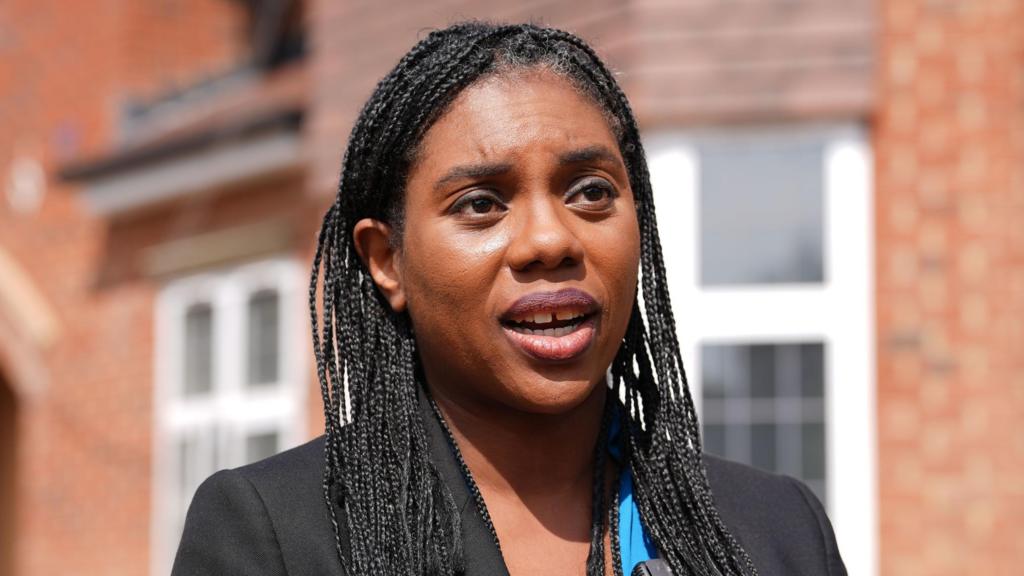Kemi Badenoch has announced that a Conservative government would ban strike action by all NHS doctors.
The prominent Conservative figure stated that the party would legislate for minimum service levels, preventing widespread industrial action by doctors and aligning their restrictions with those currently applicable to police officers and members of the armed forces.
Dr. Tom Dolphin, chair of the British Medical Association (BMA) trade union, characterized the proposal as “a desperate intervention from a Conservative Party that spent nearly 15 years failing the NHS.”
Thousands of resident doctors initiated a five-day strike on Friday after the government and the BMA failed to reach an agreement regarding pay.
In the UK, current legislation prohibits members of the police force and non-civilian members of the armed forces from striking. Doctors possess the same right to strike as any other employee within the public or private sectors.
The previous government enacted a law mandating minimum service levels in specific sectors, including certain health services, but it only reached the stage of considering its application to doctors.
The BMA asserts that despite a 5.4% average pay rise this year, following a 22% increase over the prior two years, pay remains a fifth lower than in 2008 when adjusted for inflation.
The union contends that a 26% pay increase is necessary to reverse the real-term wage decline.
Announcing the policy on Sunday, Badenoch accused the union of becoming “more and more militant,” adding that the pay rise resident doctors had already received was “well above anything that any other group has had”.
“Doctors do incredibly important work. Medicine is a vocation, not just a job. That is why in government we offered a fair deal that supported doctors, but protected taxpayers too,” she said.
“That is why Conservatives are stepping in, and setting out common sense proposals to protect patients, and the public finances.
“We are making an offer in the national interest – we will work with the government to face down the BMA to help protect patients and the NHS.”
Dr. Dolphin stated that industrial action was a “last resort” for doctors and “fundamentally the right to strike should always be there.”
“Threatening to ban strike action is not the right response for a modern democracy,” he added.
Dr. Dolphin clarified that the BMA and NHS England have a pre-arranged protocol for hospitals to request that striking doctors return to work in cases of unforeseen emergencies or mass casualty events.
He added: “That process is there day and night throughout industrial action, and we remain ready to respond to any emergency requests.”
Prior to the commencement of the strike, Health Secretary Wes Streeting stated that the government would “not let the BMA hold the country to ransom” and asserted that disruption in the NHS would be kept to a minimum.
NHS England had directed hospitals to only cancel non-urgent work in exceptional circumstances.
Official figures regarding the impact of the latest strike are yet to be released. Some hospitals are reporting that more than 80% of non-urgent work is still being performed, with senior doctors covering for resident doctors.
However, several patients have informed the BBC that operations scheduled during and around the strike period have been cancelled or postponed.
The Conservative party argues that its proposed changes would align the UK with other countries, such as Australia and Canada, which have stricter regulations concerning industrial action.
Other nations, including Greece, Italy, and Portugal, also have laws in place to ensure minimum service levels within their health services, but the BMA has described the party’s argument as “misleading.”
The BBC has contacted Labour for comment on Badenoch’s proposals.
Paul Johnson, who works at Hull Royal Infirmary, has received an NHS Chief Nursing Officer Gold Award.
Patients have told the BBC they sympathize with resident doctors but are concerned about surgery delays.
A new £5m national pilot scheme aims to assist those most affected by unemployment in entering the health service.
The new equipment provides enhanced images and diagnoses while exposing patients to less radiation.
Gaza is prominently featured on the front pages, while the Daily Telegraph focuses on prostate cancer screening.

